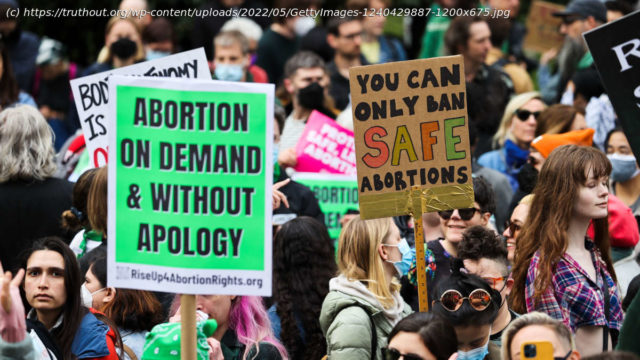If SCOTUS overturns “Roe” without condemning trigger legislation, this could become the main strategy for conservatives.
Fueling widespread anguish over this week’s revelation that Roe v. Wade will likely be overturned in the coming weeks is the reality that the end of Roe would immediately activate civil and criminal penalties for those who obtain abortions or assist people to obtain abortions in 13 states. Roe v. Wade is the 1971 landmark case that provides persons with the capacity to become pregnant with a fundamental right to abortion access. Justice Samuel Alito’s leaked draft opinion in Dobbs v. Jackson Women’s Health Organization holds that because abortion is not a right “ deeply rooted in history,” it is not an unenumerated right that warrants constitutional protection. If Roe is overturned, each state would determine its own rules regarding the legality of abortion. In this situation, states would be permitted to pass laws that ban abortions altogether, including outlawing exceptions for rape or incest. If the final opinion in Dobbs reflects Alito’s draft, it would be the first time in history that the Supreme Court takes away a fundamental right. Quoting the late Justice Antonin Scalia’s dissent in Casey v. Planned Parenthood, a 1992 case that affirmed the fundamental right to abortion access in Roe, Alito writes, “The permissibility of abortion” is to be resolved “by citizens trying to persuade one another.” This glib reference to democratic deliberation grossly neglects the aftermath that awaits a post -Dobbs U.S. and how it would deprive persons with uteruses of a liberty protected by the Constitution. In reality, a resolution on abortion will not be worked out by citizens in the public domain or contested in the marketplace of ideas. Overruling Roe would immediately restrict abortion access in some states due to trigger legislation. Trigger legislation is a law that contains both a substantive provision and a trigger provision. The substantive provision of the law outlines what the law would be if the court were to change any given precedent. In most states with anti-abortion legislation, the trigger provisions plainly state that abortion restrictions would take effect as soon as Roe is overruled. For example, Louisiana’s RS 40:1061, trigger legislation passed in 2006, bans all abortions without exception and reads, “… this Act shall become effective immediately upon, and to the extent permitted, by the occurrence of … any decision of the United States which reverses in whole or in part, Roe v. Wade … thereby restoring to the state of Louisiana the authority to prohibit abortion.” At present, many other states — Tennessee, Arkansas, Kentucky, North Dakota, Missouri, South Dakota and Utah — have passed anti-abortion trigger legislation that awaits and anticipates the U.S. Supreme Court overruling Roe v. Wade. To be sure, trigger legislation does not have to be as explicit as the 2006 Louisiana law. For example, in 2019 Georgia passed HB 481, which bans all abortions after six weeks; it also criminalizes all attempts to obtain an abortion after the six-week cutoff. These criminal statutes are currently unenforceable under Casey, but Alito’s draft makes clear that the court would be overruling both Roe and Casey. This means that, after a person endures a six-week pregnancy in the state of Georgia, self-termination of that pregnancy would be murder, traveling to a different state to obtain an abortion would be conspiracy to commit murder, and assisting someone with obtaining an abortion would be conspiracy to commit murder in a post- Dobbs world.
Home
United States
USA — Criminal Overturning “Roe” Would Immediately Activate Abortion Penalties in 13 States






